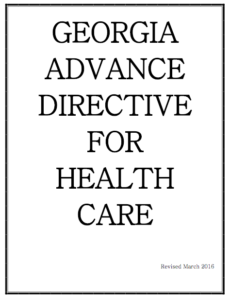Share this
[tm_pb_section admin_label=”section”][tm_pb_row admin_label=”row”][tm_pb_column type=”4_4″][tm_pb_text admin_label=”Text”] 
It was created to replace the old living will and power of attorney for healthcare.
Prior to 2007, Georgians could execute a living will and a power of attorney for healthcare. The living will allowed you to express your treatment wishes, or as my grandma called it “the plug-pulling document,” and the power of attorney allowed you to name someone to make your healthcare decisions if you were unable to do so. Both of these documents were confusing, cumbersome, and ultimately ineffective. The living will had a double negative in it, making a person’s wishes very unclear, and Georgians did not complete either of these documents in any meaningful numbers.
Georgia wanted to help make advance care planning easier and more accessible.
Georgia made an effort in the early ‘00s to reduce confusion, inconsistency, and out-of-date terminology with the ultimate goal of reducing any barriers to Georgians executing advance care planning. We were following the trends set by other states as we were all responding to the circumstances of Terri Schiavo. At 26, Ms. Schiavo experienced a collapse, cardiac arrest, and brain damage. After eight years of rehab with little success, her husband decided to remove her feeding tube. Ms. Schiavo’s parents intervened to keep her feeding tube in place, and Ms. Schiavo’s healthcare matters were litigated in the local, state, and federal courts, involving both a governor and president of the United States. In 2005, 15 years after Ms. Schiavo’s collapse, her feeding tube was removed, and she died. In response to this complicated and heart-wrenching case, many states decided to update their advance directive laws to encourage the use of such tools in planning for future healthcare wishes. Georgia did a great job of reshaping our laws to combine the two existing documents (the power of attorney for healthcare and the living will) into one document. Our current Georgia Advance Directive is easy to complete and share with others.
Everyone over the age of 18 should have an advance directive.
The Georgia Advance Directive allows you to do four really important things: 1) Appoint a Healthcare Agent; 2) Express Your Treatment Preferences; 3) Share Your Final Arrangements; and 4) Name a Preferred Guardian. These are important tasks of advance care planning that every adult should complete. Even if you have an old power of attorney for healthcare and an old living will, we encourage everyone to complete and execute a new advance directive. It is so easy to complete a new advance directive and costs close to nothing besides paper and time.
The Georgia Advance Directive is free and easy to access.
Since this document is a part of the Georgia Code, it is accessible and free for everyone over the age of 18 to use. The Georgia Division of Aging usually has a copy of the Advance Directive on their website. The form can also be obtained from most healthcare facilities or hospitals. You can download a copy of it by clicking here. Learn more about advance directives. Over the next few weeks, we’ll be exploring some of the other commonly used advance care planning resources. Stay tuned! We are passionate about Georgians completing their advance care plans. If you have any questions or concerns about the Georgia Advance Directive, please contact our office through our website or by calling us at (404) 843-0121. [/tm_pb_text][/tm_pb_column][/tm_pb_row][/tm_pb_section]
Share this
Subscribe to our blog and monthly newsletter.










